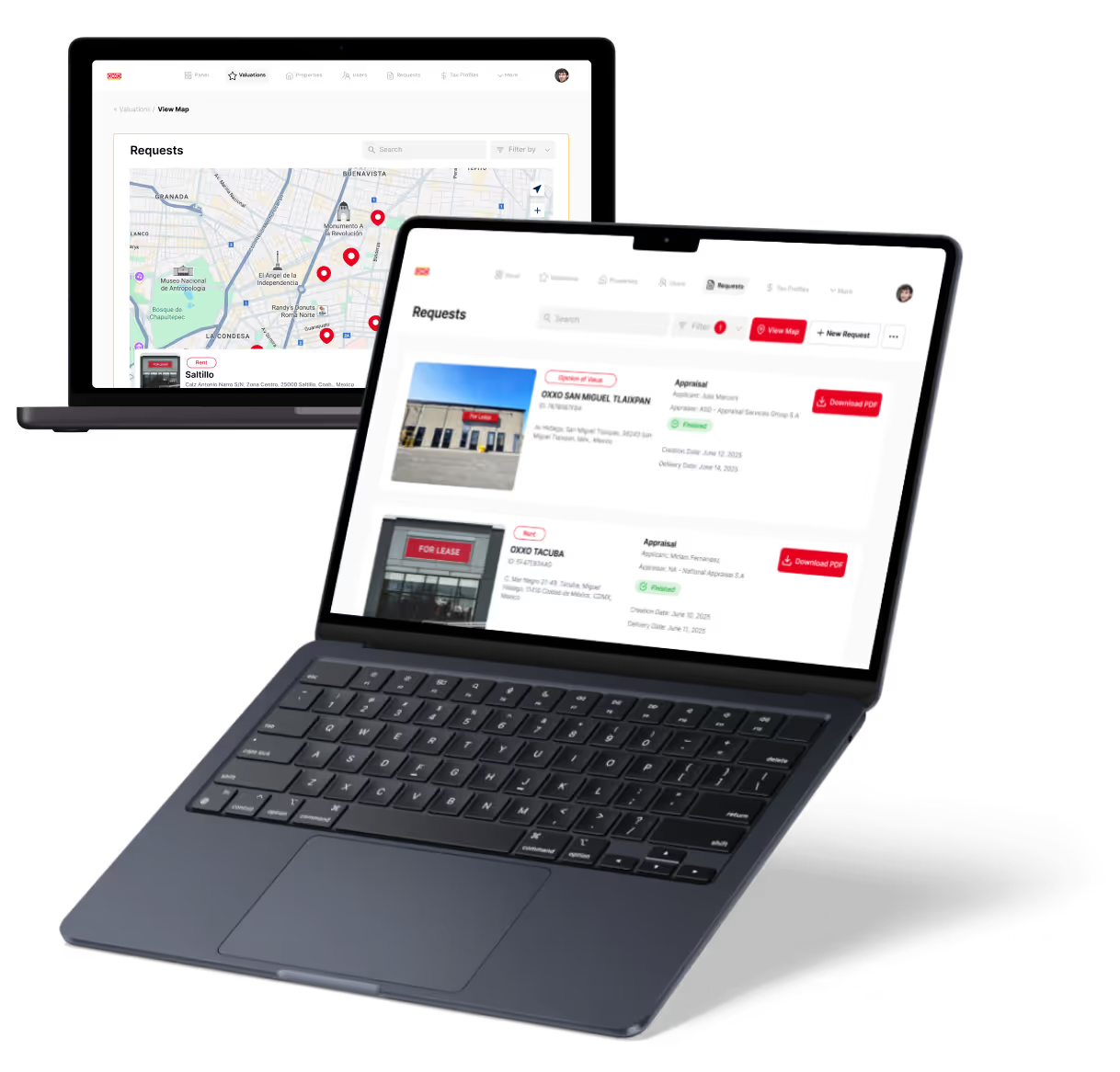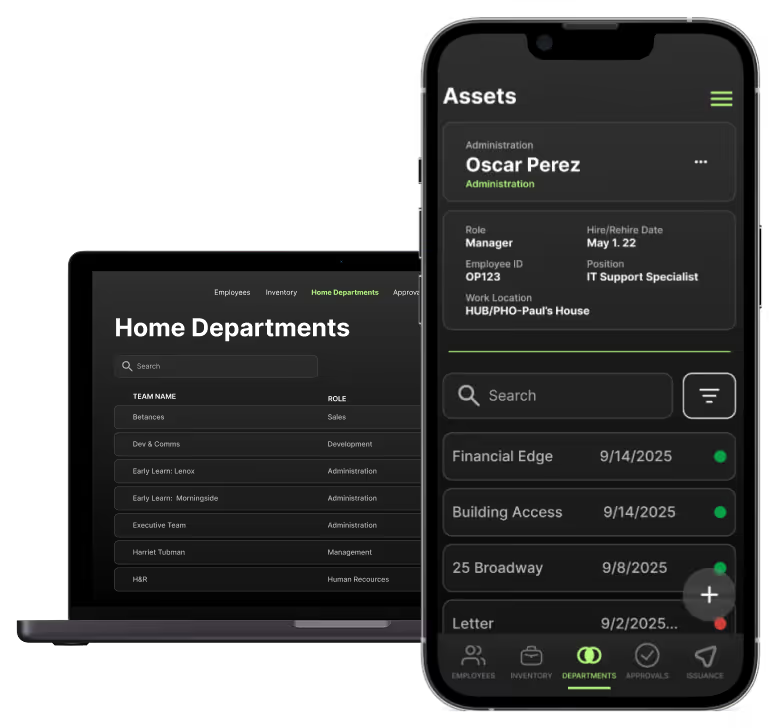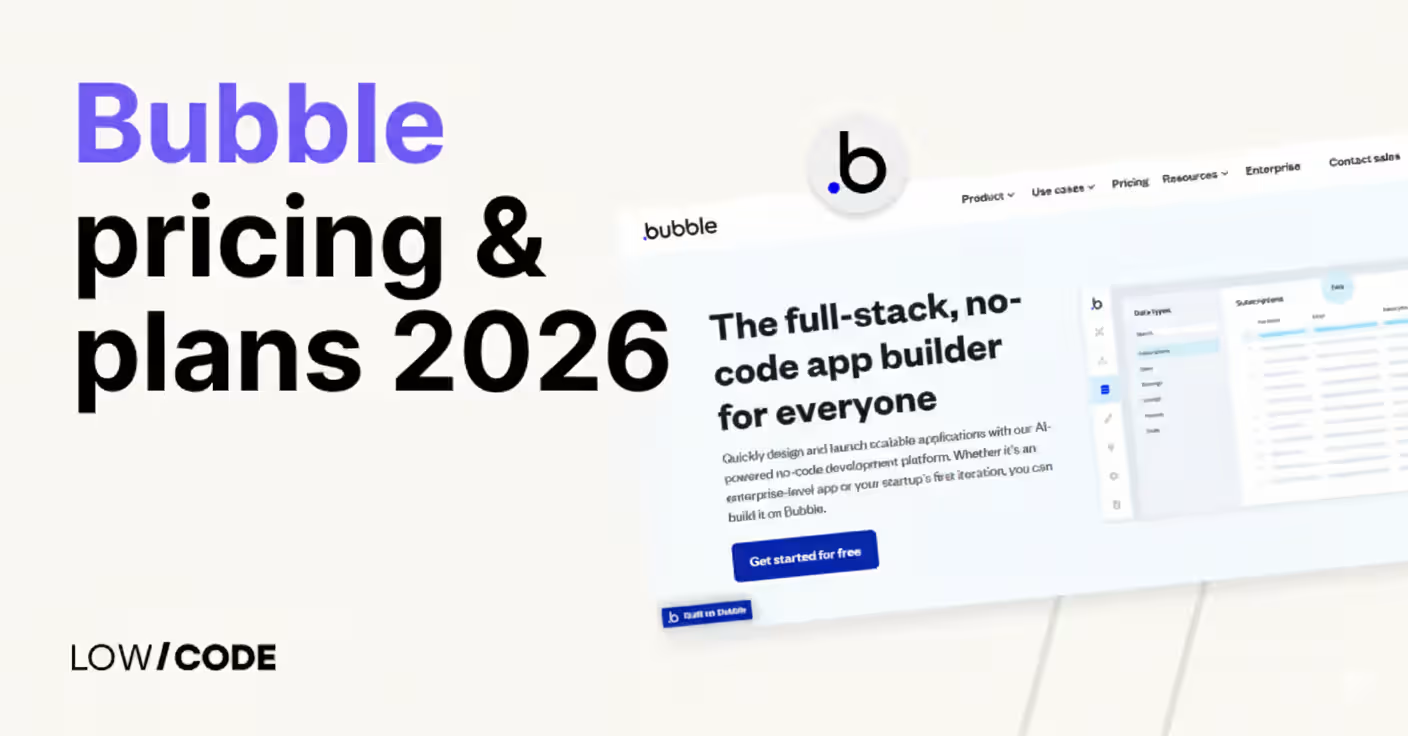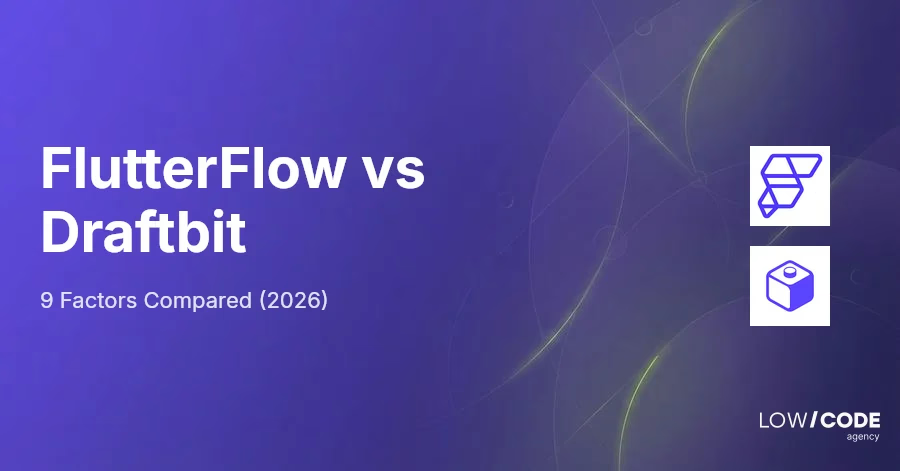Bubble vs Wix | 9 Factors to Decide the Best One
14 min
read
Compare Bubble vs Wix across design, logic, SEO, mobile, and business features to find the best no-code platform for building apps or websites in 2025

If you're building online in 2026, chances are you're choosing between platforms like Bubble and Wix.
Bubble powers over 2 million no-code developers and is best for building web applications with custom workflows, databases, and user interactions.
Wix, used by more than 250 million users, is ideal for building websites quickly with built-in eCommerce and marketing tools. Bubble gives you full control over app logic and user behavior, while Wix gives you speed, simplicity, and beautiful templates.
In this guide, we compare them across design, backend logic, mobile, SEO, e-commerce, and more to help you decide which tool works best for your project.
Quick Comparison Table - Bubble vs Wix
1. What’s the core difference between Bubble vs Wix?
The core difference between Bubble and Wix is the type of apps they’re built to create.
Bubble is a powerful no-code platform for building web applications with complex logic, user accounts, databases, and workflows. You can create SaaS tools, dashboards, marketplaces, and internal apps—all without writing code.
Wix, on the other hand, is a website builder made for creating marketing websites, portfolios, blogs, and small online stores. It’s easy to use, comes with drag-and-drop templates, and is great for users who need a fast online presence.
If you want to build an app that works like software—with forms, logins, user dashboards, and automation—go with Bubble. If your goal is to build a simple, professional website to show your business, brand, or content online, Wix is the better option.
2. Ease of use and learning curve
Let’s start with how easy each platform is for beginners and non-technical users.
Is Bubble easy to learn for beginners?
Bubble is powerful but has a steep learning curve. It uses a visual editor to design pages, build workflows, and manage databases. While no coding is needed, beginners will need time to understand how data, logic, and UI work together.
The platform offers helpful tutorials and a strong community, but it may feel overwhelming at first. If you’re building a full app, Bubble is worth learning, but it requires more effort than typical website builders.
How beginner-friendly is Wix for non-technical users?
Wix is one of the easiest platforms for beginners. It uses a true drag-and-drop interface where you can place elements anywhere on the page. You start with a template and edit text, images, and layout with just a few clicks.
There’s no need to understand logic or database systems. It’s perfect for small businesses, personal websites, and users who want to launch quickly. Wix also includes AI tools like Wix ADI to build your site for you in minutes.
Read more about:
3. Design flexibility and visual control
Next, let’s look at how much control you get over design and layout in each platform.
What level of design control does Bubble.io offer?
Bubble offers high design flexibility. You can build responsive layouts, control element spacing, and create dynamic pages linked to your database. You’re not limited by templates and can start from a blank canvas. It supports custom fonts, animations, and even CSS-like styling through the editor.
While it's more complex than drag-and-drop builders, it gives advanced users the power to create highly customized UI for web apps. You can also use conditionals to change layouts based on user input or data.
Can you customize layouts easily in Wix?
Yes, Wix is known for easy layout customization. You can drag elements like text, buttons, and images anywhere on the page. The editor offers full control over fonts, colors, spacing, and alignment. You can also switch themes and templates with minimal effort.
However, since it’s designed for websites and not apps, Wix may limit interactivity or layout behavior beyond static content. For most small businesses or creators, Wix offers more than enough customization to create polished and professional-looking websites.
4. Backend logic and workflows
Now let’s compare how each tool handles interactivity and backend functionality.
Can Bubble.io handle complex logic and app behavior?
Yes, Bubble is built for logic-heavy web applications. You can create complex workflows using visual triggers and actions. These can include user logins, database changes, email sending, or condition-based actions. Bubble also supports scheduled events, custom states, and API integrations for deeper app logic.
Everything runs visually through the workflow builder, allowing powerful backend logic without code. Whether you’re building a SaaS app, booking system, or dashboard, Bubble gives you the tools to manage complex behaviors across users and data.
Does Wix support backend workflows and interactivity?
Wix supports basic workflows like form submissions, contact forms, and e-commerce actions. For more advanced functionality, it offers Velo by Wix, a low-code environment where you can add JavaScript to handle custom interactions.
While this expands its backend options, it’s not as visual or powerful as Bubble. Most Wix users stick with simple use cases unless they’re comfortable coding. So, if your goal is to build a feature-rich app or automate business logic, Wix has limits compared to Bubble.
5. SEO and performance
Let’s see how both platforms help your website or app rank and perform well.
Is Bubble good for SEO and speed?
Bubble includes some SEO features like custom page titles, meta tags, and alt text. You can also manage slugs, 301 redirects, and add HTML tags manually. However, since Bubble apps are dynamic and JavaScript-heavy, page speed and SEO performance can suffer if not optimized properly.
You’ll need to actively manage image sizes, load speed, and SEO settings. While it can be SEO-friendly with effort, it’s not as easy or automatic as platforms made for marketing websites.
What SEO tools and performance features does Wix provide?
Wix has excellent built-in SEO tools for beginners. It includes editable meta tags, page slugs, alt text, and redirects. It also offers structured data support, built-in sitemap generation, and mobile optimization.
Wix sites are automatically hosted on a fast global CDN, which helps with loading speed and SEO performance. There’s even a step-by-step SEO checklist to help you improve rankings. For small to mid-size websites, Wix is a strong choice for users who want SEO without complex setup.
Read more about:
6. Mobile responsiveness
Let’s compare how mobile-friendly both platforms are and what controls they give you.
Does Bubble support mobile-friendly design?
Yes, Bubble supports responsive design using its layout engine. You can control how elements adjust across screen sizes using rows, columns, and alignment tools. However, it takes more manual effort than most builders. If not set up properly, your app may not look right on mobile.
Bubble also lets you hide or show elements based on device width. It gives full flexibility, but you need to plan mobile design carefully. It’s great for web apps, but not automatically mobile-optimized.
Is Wix optimized for mobile out of the box?
Yes, all Wix templates are responsive by default. When you build a site, it automatically adapts for mobile and tablet screens. Wix also provides a mobile editor, where you can tweak layouts, hide elements, or adjust sizes specifically for mobile. You don’t need to set up breakpoints manually.
For small businesses or personal sites, this makes mobile optimization easy and fast. Wix ensures a consistent experience across devices with minimal effort from the user.
7. E-commerce and business tools
Now let’s look at how each platform supports selling products and running a business.
Can you build online stores or business features in Bubble?
Yes, Bubble can power online stores, client portals, booking systems, and more. But it doesn’t have built-in e-commerce tools—you need to build everything from scratch or integrate with Stripe, PayPal, or other APIs. This gives you full control but takes more time.
You’ll design your product catalog, cart, checkout flow, and order system manually. It’s ideal if you want to build a unique tool or SaaS product. For plug-and-play e-commerce, it’s less efficient than dedicated platforms.
What e-commerce and marketing tools does Wix offer?
Wix has built-in tools for creating online stores, including product pages, shopping carts, inventory tracking, payment gateways, and coupons. You can sell digital or physical products, offer subscriptions, and run email marketing campaigns.
Wix also includes CRM features and marketing automations. Everything is set up through easy menus, with no need for custom code. It’s perfect for small shops and service-based businesses that want to sell online and promote through one platform.
8. Hosting and security
Let’s finish the comparison with how each platform handles hosting and protection.
Is hosting and SSL included with Bubble?
Yes, Bubble includes hosting, SSL encryption, and automatic backups with all paid plans. Your app is hosted on AWS infrastructure with global content delivery. You don’t need to manage servers or SSL certificates manually. Security features include DDoS protection and privacy controls for user data.
However, you’re still responsible for setting up privacy rules and secure workflows inside your app. For advanced control, you can upgrade to Bubble’s dedicated plan for extra server resources and isolation.
Does Wix offer secure hosting with built-in features?
Yes, Wix offers secure and fully managed hosting on all plans. It includes free SSL certificates, DDoS protection, daily backups, and fast content delivery using a global CDN. You don’t need to configure anything—everything works out of the box. Wix also complies with key privacy regulations like GDPR.
It’s designed for small business owners who want peace of mind and don’t want to deal with server management or security setup. Hosting and updates are automatic.
Read more about:
9. Final verdict – Bubble or Wix?
Let’s wrap up with when to choose one tool over the other, based on your project needs.
When to choose Bubble over Wix
Choose Bubble if you need to build a real app—not just a website. It’s perfect for SaaS tools, booking systems, user portals, or any idea that needs forms, user logins, and database logic. You get full control over how your app behaves, looks, and grows. Although it takes more time to learn, you can build advanced features without writing code. Bubble is a strong choice for startups, founders, and builders who want flexibility and custom workflows without relying on a developer.
When to choose Wix over Bubble
Choose Wix if you need a fast, beautiful website with built-in features. It’s great for small businesses, online stores, freelancers, and personal sites. You can pick a template, drag in content, and launch in a day. Wix includes SEO tools, mobile design, and secure hosting out of the box. It’s easier to learn and manage compared to Bubble. If your goal is to showcase content, sell products, or create a branded site without worrying about logic or databases, Wix is the better fit.
Created on
July 2, 2025
. Last updated on
January 30, 2026
.

FAQs
Is Bubble harder to use than Wix?
Can I build an online store with Bubble?
Does Wix support user logins like Bubble?
Is Wix better for SEO?
Which is better for mobile design?
Can I export my site from Wix or Bubble?
















